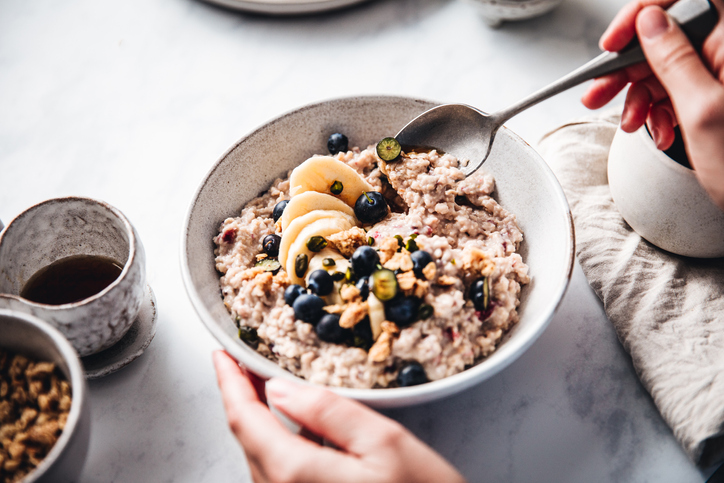Intermittent fasting is one of those wellness terms you simply cannot avoid hearing about. The new weight-loss trends have shifted the focus from cutting out a food group to when you actually consume food. Intermittent fasting, also known as IF for short, is not a new low-carb or keto diet or some new way of meal prep; it's a lifestyle that focuses on cycling between longer fasting and shorter 'feasting' time periods. It does not promote food restriction, eliminating certain food groups and focusing only on "healthy foods," lowering your calorie intake, or any other "dieting" factors. It's simply a way of scheduling all of your meals within a certain timeframe.
Videos by Wide Open Country
The fasting period can be anywhere from 12, 16, or 18 hours to 24, 48, or even 72-hours (pretty extreme and heavily regulated and supervised), and it can be done every day, every other day, a few times per week, or in case of these longer fasts, once per month or quarter.
The supporters of intermittent fasting swear on its vast health benefits, claiming it boosts their energy levels, lowers blood pressure, triglycerides, and cholesterol, improves focus and mental clarity, keeps their health in check, prevents heart disease, and promotes healthy weight loss without the yo-yo effect.
Still, even with all these positive claims, it's important to advise that intermittent fasting might not be suitable for everyone, and before changing anything within your current eating habits, consult with your physician and let them assess your situation.
Why Intermittent Fasting?

Getty Images
Intermittent fasting gained popularity overnight as a number of celebrities reported it being the only thing that helped them lose weight and body fat, prepare for their role, stay in shape, keep their immune system working like a clock, and endure all the long and exhausting workdays.
In reality, intermittent fasting dates back to the early ages, when our ancestors spent hours or days hunting and surviving only on the occasional wild herbs and fruit. But, even if you don't know how intermittent fasting works, you've most likely been doing it while you're sleeping. Especially if you're one of those people who can't function unless they get their 10 hours of sleep per night or when your working schedule prolongs the time in between your meals. The reason why this "new type" of intermittent fasting is so different is that it's controlled and regulated.
Eating Windows
The most popular eating windows are: 18/6, 16/8, or 14/10 where 18, 16, and 14 are the number of hours you spend in the fasted state, and 6,8, or 10 are the number of hours you're supposed to consume all of your meals in.
What will be the best timeframes for your lifestyle depends on your own preference, daily schedule, circadian rhythm, and time management. Is there a period that works better than others? Is skipping breakfast better than having your dinner early? Scientists and researchers disagree on the answer.
Some, like Dr. Courtney Peterson, PhD, assistant professor of nutrition at the University of Alabama at Birmingham, claim how "In most people, blood sugar control is best in the morning and gets worse as the day progresses. You also digest food faster in the morning. So there's a metabolic advantage to eating earlier in the daytime."
Others, like Dr. Eric Berg, talk about the benefits of skipping breakfast and delaying the insulin spike until later in the day. Since the verdict is still out on what time you should break your fast, finding what works best for you will be determined by how consistent you'll be able to keep it.
24-hour fast or Eat Stop Eat Method

Getty Images
This fasting method was created by Brad Pilon, and it involves fasting 20-24 hours, up to two times a week, but never on consecutive days. He claims this method promotes weight loss (as stored fat starts being used for fuel), improves retention of muscle, reverts insulin resistance, and lowers the risk of chronic disease. Although numerous studies have been conducted thus far, none of them can definitively support these claims and therefore promote this type of lifestyle for improved health and longevity.
5:2 Method
Created by dr. Michael Mosley, the 5:2 approach heavily focuses on the weight loss aspect of intermittent fasting as it does include calorie restriction as well. The name stems from the way it schedules out the eating routine for the week: 5 days of 'regular' eating (around 2000-2500 kcal per day) and 2 days of extremely restrictive eating of about 75% decrease (500-800), with the low calorie-days not being consecutive. You can probably tell how just like the Eat Stop Eat Method, this IF approach isn't something you should try by yourself or without consulting with your physician.
The Positives

Getty Images
Fasting or alternate-day fasting is not a novelty (remember, we all fast while we sleep), but with its growing popularity, researchers and scientists all over the world have been conducting numerous animal and human studies, trials, and experiments. The results have thus been pretty positive, especially regarding obesity, type 2 diabetes, lowering insulin levels and blood sugar levels, maintaining good blood pressure and cholesterol levels, Alzheimer's disease, and lowering the risk of cardiovascular disease. There's also plenty of good news on reducing inflammation and improving chronic inflammatory diseases, as well as stimulating autophagy (death and recycling of cells) which activates nerve cell repair and aids in cancer prevention and treatment.
One of the greatest benefits of intermittent fasting and the underlying reason for reducing all of the health risk factors is the fact it makes our bodies go through major repair mode. Instead of spending energy on digesting food and dealing with potential toxins, eliminating waste, and over-triggering our hunger hormones, our bodies are recharging batteries, renewing cells, boosting our immune system, improving brain health and heart health, and repairing anything that needs attention. Think of it as prolonged beauty sleep.
Another great benefit of intermittent fasting is no restriction when it comes to actual food choices. This is not a low-carb or low-fat diet that promotes only specific ingredients. During your eating window, you can consume anything you normally would, from protein to fats and carbohydrates, a variety of fruits, vegetables, and whole grains, as well as your favorite dessert. The only thing that changes is the period of time you're actually eating your meals. Still, in order to really boost your weight loss goals and promote overall health and wellness, you should stick to a healthy diet and a healthy lifestyle, whether you're fasting or not.
The Other Side of The Coin

Getty Images
Nobody likes feeling hungry and starved, and although the majority states how their hunger regulates over time, there are still people who cannot endure the long fasting periods and it leaves them irritable (hangry), moody, hard to concentrate, and energy depleted. The same goes for eating large amounts of food in small timeframes - some people report constantly being bloated and feeling a heaviness which doesn't seem to go away even after giving intermittent fasting a few months.
This causes an unintentional lower calorie intake which results in weight loss, sometimes greater than the person needs, especially if the weight loss wasn't their primary reason for starting IF in the first place. Some medical professionals even go a step further by saying it can increase your cortisol levels as well as disrupt your sleep.
In addition, there are certain groups of people who shouldn't be limiting their eating windows, and these include:
- Pregnant and breastfeeding women - proper nutrition is crucial when it comes to carrying out a healthy pregnancy and maintaining a steady milk supply. Implementing some sort of fasting diet can severely impact both, causing negative side effects as the body fears starvation. The usual diet for pregnant or breastfeeding women includes short-term fasting periods that shouldn't exceed 4-6 hours.
- Those with a history of eating disorders - Even though intermittent fasting doesn't promote eating disorders, it can definitely harm those who are already familiar with them. Restriction, in any way, shape, or form, is a major trigger. Limiting eating windows can become a challenge, and over a period of time, they can become shorter and shorter, causing a variety of health conditions.
- Those with type 1 diabetes - even though there are some positives when it comes to intermittent fasting and diabetes, dropping glucose levels isn't always favorable. With type 1 diabetes, the pancreas cannot produce insulin, making you dependant on insulin injections. When the blood sugar levels drop too low, this can cause an insulin shock, which can be extremely dangerous.
- Those on medications that need to be taken with food - if you're on a specific medication that requires consuming food due to nausea, dizziness, or other side effects, intermittent fasting can be detrimental to your health. When there's a specific schedule you need to adhere to, make sure you're following the medical advice from your doctor.
The Verdict: Is Intermittent Fasting Healthy?
So, is intermittent fasting healthy? Even though there are studies that report its vast benefits, none of them can claim with absolute certainty that IF is the best lifestyle for everyone and call it the key to health and longevity. The research we have is still very fresh, and until more and longer studies are conducted, the verdict will still be out.
If you're interested in trying it out, take a second to figure out why you're choosing this approach, consult with your physician for medical advice and let him guide you through it if they believe it would be good for your health and fit into your current lifestyle.
And remember, every person is different, and just like there's no universal diet that will work for everyone, there's no universal lifestyle that will work for everyone either. So it's really true when they say that the best diet, exercise, or anything that becomes a part of your daily routine is the one you can stick to.
Karla Ilicic is a writer, yoga teacher, nutritionist, and wellness coach with a strong passion for wellbeing and fitness. Helping others lead happier and healthier lives is her lifetime goal. She's a mom of an energetic and playful one-year-old and wishes even more so to stay on top of all things health and wellness-related.




